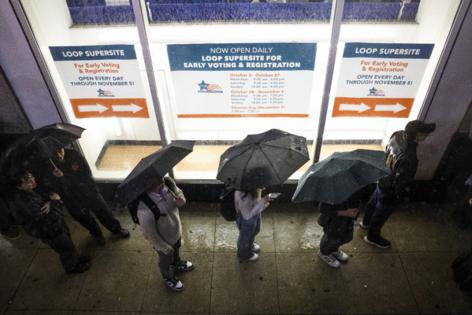Chicago Board of Election workers should not be barred from unionizing, judge finds
Published in Business News
The Chicago Board of Election Commissioners had previously argued that the state’s election code barred its employees from forming a union. But the law shouldn’t be read that way, administrative law Judge Anna Hamburg-Gal found in an order Monday that paves the way for official recognition of the union.
City elections workers, including clerks, polling place investigators and equipment specialists, first sought union representation with the Service Employees International Union Local 73 nearly a year ago, saying they were frustrated by “stagnant” wages that didn’t keep pace with the cost of living in Chicago.
But the board of election pushed back on the proposed bargaining unit of 80 to 90 workers.
Attorneys for the board argued that because election workers are prohibited from engaging in “political activity” by the state’s election code, they should therefore be barred from joining SEIU.
In legal filings, hired counsel for the board of election noted that SEIU 73 is politically active, lobbies legislatively and makes endorsements and financial contributions to political candidates.
The union, for instance, helped propel Chicago Mayor Brandon Johnson, who received more than $4 million in contributions from SEIU affiliates during his mayoral campaign, to victory.
“The Union has, in part, an undeniable political purpose,” the board’s attorneys wrote last year.
But in her order, Hamburg-Gal found that the state’s election code “need not be read as prohibiting unionization by (board of election) employees.”
“An employee’s participation in a union does not necessarily equate to engagement in political activity,” she wrote. “Although the petitioner here engages in political activity, most of the Employer’s arguments would lose their force if the employees had sought representation by a newly formed labor organization that had committed not to become engaged in the political process.”
The board of election has two weeks to appeal the order.
Max Bever, a spokesperson for the board, declined to say whether it would do so, saying it does not comment on pending litigation. Cassio Mendoza, a spokesperson for the mayor’s office, also declined to comment.
“I would hope Chicago leadership cease their attempts to stop these workers from exercising their legal right to join our union,” SEIU 73 President Dian Palmer said in a statement. “Given the challenges our city, state, and country are facing, denying workers their right to unionize should not be happening in a union city like Chicago.”
The case is just one example of the fickle nature of public sector labor law in Illinois, where legal precedent regarding which workers are permitted to form unions and which are not can vary even within the same workplace.
Cook County assistant public defenders, for instance, have been unionized since the mid-1980s. Across the courtroom, however, county prosecutors are facing decades-old state Supreme Court precedent that threatens to block their efforts to unionize.
The landscape varies even among elections workers. SEIU 73 represents workers at the Cook County Board of Election, the local has said. Workers for the state board of elections, on the other hand, are barred from collective bargaining by state law because they regulate the financial reporting for unions’ political action committees in Illinois, the state board’s spokesperson has told the Tribune.
©2025 Chicago Tribune. Visit at chicagotribune.com. Distributed by Tribune Content Agency, LLC.












Comments